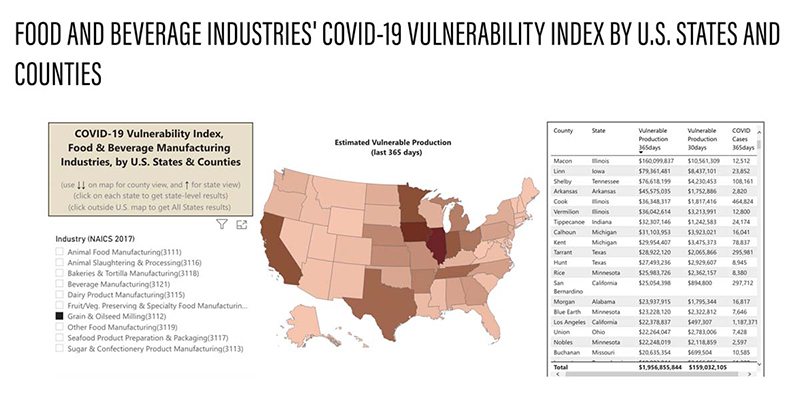October 26, 2021
Food and Beverage Industries’ COVID-19 Vulnerability Index goes live; experts available

The Food and Beverage Industries’ COVID-19 Vulnerability Index by U.S. States and Counties shows estimated production value that could be lost due to COVID-19 illness among industry workers. The grain and oilseed milling industry is selected, and the color saturation corresponds to value in dollars. The dashboard was developed through Purdue University’s Center for Food Demand Analysis and Sustainability. (Image courtesy of Purdue Agricultural Communications)
WEST LAFAYETTE, Ind. — The U.S. is facing supply chain disruptions as it enters the holiday season, and the impacts reach far beyond the delivery of gifts and ingredients for traditional meals. Purdue University experts are available to discuss supply chain disruptions and the new Food and Beverage Industries’ COVID-19 Vulnerability Index.
COVID-19 Vulnerability Index
A pair of new online dashboards show the vulnerability of food and beverage manufacturing to the COVID-19 pandemic and the economic significance of these industries across the nation.
Jayson Lusk, a nationally recognized food and agricultural economist, and head and Distinguished Professor of Agricultural Economics at Purdue University, led the team that developed the interactive dashboards. They are part of a portfolio of public dashboards created through Purdue University’s Center for Food Demand Analysis and Sustainability.
The Food and Beverage Industries’ COVID-19 Vulnerability Index by U.S. States and Counties dashboard quantifies the risks to the supply of these products. It estimates production value that could be lost due to COVID-19 illness among industry workers. The data can be tuned from the U.S. total down to an individual county. A user also can select and see data for specific food and beverage sectors, for example, dairy product manufacturing, sugar and confectionary product manufacturing, and animal processing. The dashboard is updated daily and adjusts its estimates based on the number of reported COVID cases in an area.
The Food and Beverage Industries’ Value Added by U.S. States dashboard shows the total revenue of these industries, as well as their contribution to the state’s gross domestic product, and the number of employees. It also shows the costs of materials, labor and capital for each industry, so that the relative significance of each to the supply chain can be seen.
Ahmad Zia Wahdat, a postdoctoral research associate with the Center for Food Demand Analysis and Sustainability, developed the online dashboards with Lusk.
“A goal of the center is to take scattered and challenging-to-process data and convert it into useful information that is easily accessible,” Wahdat said. “The first COVID Vulnerability dashboard focused on agriculture, and we wanted to add the food and beverage industries for a more complete picture in terms of food security.”
Jayson Lusk
Lusk is a leader in the development of online dashboards that can track, report and visually represent the factors that lead to supply chain disruptions during national and global emergencies. His team was the first to create an online dashboard to estimate the impact of the COVID-19 pandemic on a food supply chain when the team developed the Purdue Food and Agriculture Vulnerability Index in collaboration with Microsoft. The index quantifies the potential risk to the supply of agricultural products as a result of farm and agricultural worker COVID-19 illness.
Lusk oversees one of the country’s top agricultural economics programs and leads Purdue’s Center for Food Demand Analysis and Sustainability. The center’s mission is to bring together and present data in new ways to help inform the decisions of consumers, farmers, businesses, academics and policymakers. He also is an expert in food and consumer preferences, and he has authored several books about the economics of food consumption.
“COVID-19 has highlighted the complexity of food supply chains and underscores the need to understand how food makes it from farm to fork,” Lusk said. “For consumers, supply chain disruptions have contributed to rising food costs. Our center aims to help consumers, farmers and agribusinesses predict and grapple with rising inflation.”
Joseph Balagtas
Joseph Balagtas, associate professor of agricultural economics at Purdue, served as a senior economist on the White House Council of Economic Advisers when the COVID-19 pandemic began. From that point to the end of Balagtas’ term, the council focused on the economic consequences of the pandemic and related supply chain issues.
Balagtas co-authored a 2021 Agricultural and Applied Economics Association journal volume dedicated to the impacts of the pandemic on U.S. agriculture. His piece focused on the impact of COVID-19 on U.S. meat and livestock markets.
He conducts research on the economics of agricultural markets, including agricultural and food policy, the industrial organization of agricultural markets, and poverty and food security. One of his current research projects focuses on supply chain issues in livestock and meat supply chains.
“The current supply chain disruptions are complex and multifaceted,” Balagtas said. “Policy solutions that fail to appreciate the complexity may be ineffective, or even exacerbate existing problems or create new ones.”
Media Contact: To arrange an interview with Lusk, Balagtas or Wahdat, please contact Maureen Manier, mmanier@purdue.edu
High-resolution images are available at this link: Ag Econ Dashboards - Google Drive
Agricultural Communications: 765-494-8415;
Maureen Manier, Department Head, mmanier@purdue.edu

